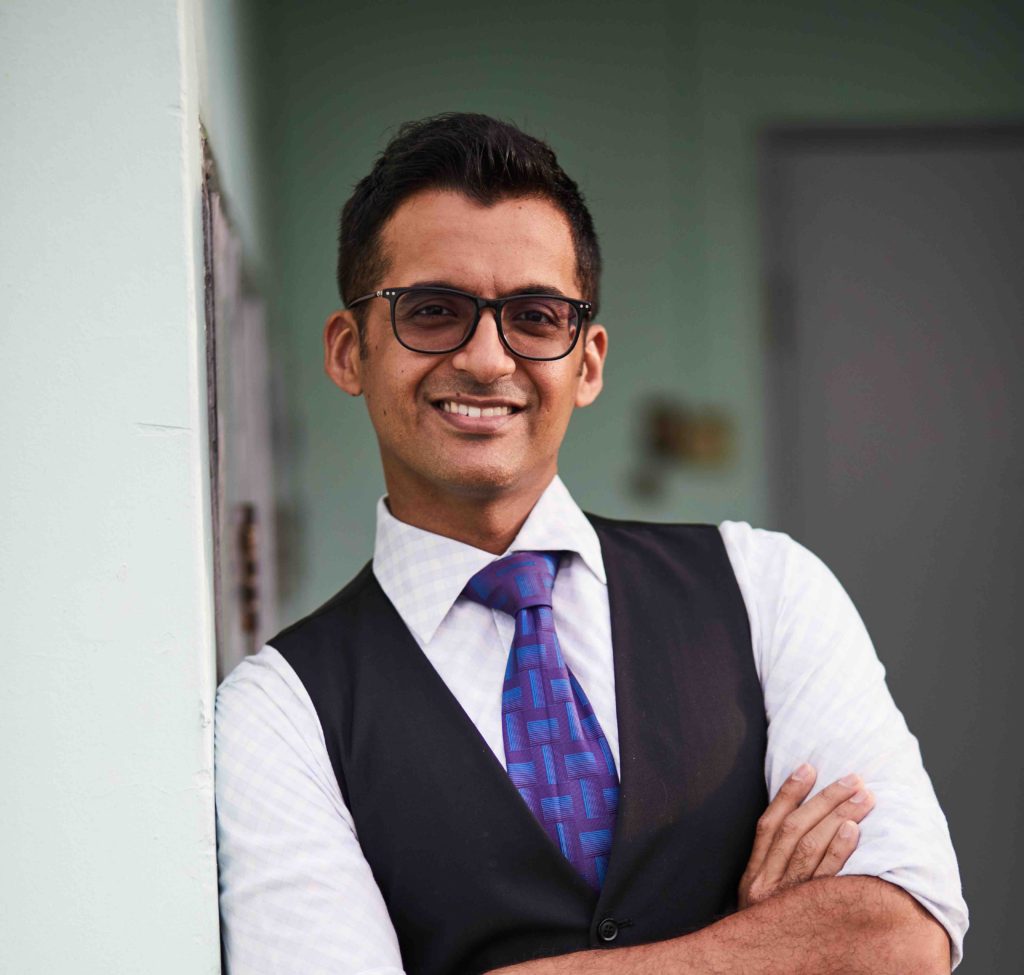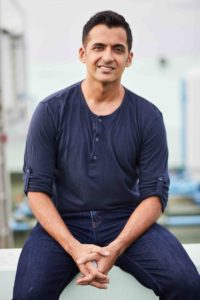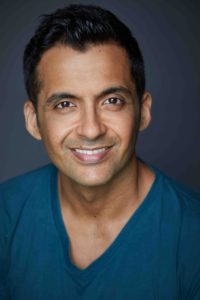SDEA Spotlight: Pavan J Singh
by SDEA

SDEA Spotlight is a series of short interviews with SDEA members that peel back the curtain behind their practice, their beliefs about arts and drama education and their influences. Pavan J Singh has been a member of SDEA since 2010. Pavan is an actor, director, writer and producer of theatre works based in Singapore, with over 18 years of experience. Some of his theatre credits include Haresh Sharma’s This Chord and Others (Esplanade: The Studios 2017), Shakespeare’s Hamlet (Theatre of Others 2017), The Man Who by Peter Brook and Marie Helene Estienne (Hot Chocolate Theatre 2016), Fat Kids Are Harder to Kidnap (How Drama, DC Fringe 2016), Dark Room by Edith Podesta (Esplanade Studio Series 2016), The Good, The Bad and The Sholay by Shiv Tandan (Checkpoint Theatre 2015); and his original works Refuge and The Boy and the Curse of the Magic-Far-Seeing Thing (Skinned Knee Productions 2016). Having graduated from LASALLE with a 1st class honours, Pavan now teaches there and at other universities, on subjects relating to acting, improvisation and performance. Under Skinned Knee Productions, a theatre company of which he is also co-artistic director, Pavan has produced works such as Mind Map of Love by Marcia Vanderstraaten (2015), Ragnarok by Andrew Sutherland (2015) and Ox by Adeline Pang (2013), amongst others. He is also a corporate trainer specializing in soft skills and communication, whose clients include leaders from the financial, banking and legal industries. 1. What are you working on at the moment? I am doing a few things. I’m currently rehearsing for a show at the Esplanade; “This Chord & Others” which will open on 30th March 2017. Rehearsals are getting more and more intense, we are doing 5 days a week, either 1pm - 5pm or 7pm - 11pm every night.
During the day, I’m usually doing corporate training which includes corporate role-play work. Corporate role-play work is when a management company, such as a bank or a normal financial company, hire training companies to come in and teach their employees soft-skills.
Corporate training for me is about teaching people human behaviour and empathy. The participants learn about body language and tone of voice, which actors study. I have a background in business and economics, and I used to work in an office as a Marketing Executive. Now that I have studied acting, the application of both those experiences is perfect in my work as a corporate trainer.
Last semester, I taught comedy to Level 2 diploma students at LASALLE College of the Arts which was successful and I’m looking forward to teaching it again next semester.
**

- How has your work changed**?
The nature of the work hasn’t changed a great deal. But as an actor, my decisions have become a lot more mature. With experience, I know how much a certain decision or an acting choice is going to affect someone.
I also notice that my feedback to participants and the decisions I make in the space have become more refined with every job and production I do or am in. I’ve also become more and more confident and relaxed. It is rare that I go into a production where I am at all nervous now. I know exactly what to do and how to process anything that I have not done correctly.
3. How do you keep your work fresh?
Just keep accepting work. That was definitely my policy when I got out of drama school which is great because when you first start out, you may have an idea of how you fit into the world but the real world may hit you hard.
When I graduated from drama school, Universal Studios (Singapore) just opened. They were looking for an opening cast and I got that job. For one year, I was making good money, and I had steady work, but it wasn’t artistically fulfilling. After Universal Studios (Singapore), I had saved as much as I could. For a year and a half, I was doing anything that came my way as a freelancer.
If it fit my schedule, even if I only had 6 hours of sleep for those 2-3 days, I would take it because I wanted to get experience. That year, I did 8 productions. They ranged from amateur plays, student productions to 1 or 2 professional theatre work. Through it all, I learnt a lot about my limits. In my last production, a play called “The Kanjoos” by HUM Theatre, Daisy Irani said, “Pavan I don’t see joy in your face when you’re working”. It didn’t occur to me before but I realised then that I was not enjoying this anymore because I was burned out. From that point on, I slowed down by choice and took on work that’s fulfilling or artistic.
**

- What makes a good educator?**
You got to know your stuff but the most important thing is that you have to be sincere and truthful. You have to want to teach with no ego. So, when a student sometimes challenges you or they say things to question your authority, always understand that it is coming from a place of curiosity and learning. Some students like to learn like that, they are constantly challenging; but why? you said this last time. And if you start getting defensive, or antagonistic, because sometimes teachers think that the person is being that way because they’re being an asshole, but they are not. That's just their way of questioning.
To challenge is the best way to get the best response. But Asian students are all about; but sir, how ah? They are very defensive and apologetic. So apologetic that sometimes they won’t even ask the question. For them, you sort of have to anticipate what the confusion is and just try to guess. But always remember that it comes from a place of curiosity, all comes from a place of wanting to learn.
If you ask me makes a better educator? It’s cliché, but you’ve got to want really want to teach. That’s the thing a lot of people lie to themselves about. They’re teaching because they want the money, they’re teaching because they like academia. They are teaching because of those reasons and they convince themselves, that they like to teach and they want to but deep down they don’t. It’s being truthful to yourself, being truthful to your students, and you have to know your stuff, you have to know what you are talking about.
5. Why do you think drama should be taught in school?
I think the arts needs to be 100% funded by taxpayers. It is as important as the medical industry, as medicine, as health care, as national security. The arts is so integral for the human psyche because the arts truly teach you about empathy.
I firmly believe that people here are unhappy because for the first 40 years of independence, the focus was on quantitative sectors such as engineering, mathematics and science. On the other hand, arts and sports became completely devaluated and that has resulted in a society that’s really efficient and consumeristic because that’s how they have been taught to measure happiness. But a person can have all this stuff and will still be unhappy because people need human connection, not more stuff.
Through the arts, we learn about humanity and characters. We don’t learn about being human academically by quantifying it, analysing it, you have to experience it. That is why it is important that the arts should be fully funded even in adulthood. Arts programmes, theatre productions should be fully funded by taxpayer’s dollars. Everyone should chip in to build the arts scene to allow more people to participate and get into the arts.
6. Who was the drama educator that impacted you the most?
I would say my first acting teacher in LASALLE, the head of acting at the time, Terence Crawford. He was the head of acting when I first joined. I consider myself so lucky because this guy was an all-rounder. He was an academic, a scholar, he was also a practitioner, and he was multi-talented. He could act, direct, he could sing, and he also understood everything from an academic point. He was a Shakespearen scholar and he did his masters in Chekhov. He was just this guy who loved theatre, he loved the arts and he wanted to know everything about it. He was also an amazing communicator, he was so articulate that he could take the most complex problems with any question and just break it down; this is the reason.
Above all else, he was just that amazing inspiring teacher, he would come to the space, he had the energy of a student and he would bounce around the room. When he was directing you, he would show you; what if you did this, what if you did that. When he was done, he would just summarise everything so articulately and so beautifully. He answered a lot of my questions about theatre and art and why it is important and how you can contribute as a student or an actor. He did all that and still maintained a level of professionalism. I definitely model a lot of my behaviour around him because I found it to be so effective.
7. So which was your most memorable event, memorable moment on stage or in a classroom?
There have been quite a few. My last production in my first year, called “List” is a movement theatre piece that was directed by Edith Podesta. It was the first time I was in a production that was not really characterisable. It was movement theatre piece and being from Kuala Lumpur, I’ve never seen a movement theatre piece. It was tremendous.
The storyline was simply about a guy who was constantly focusing on work that he forgot about his wife and his wife leaves him. Edith had characters on stage doing repetitive movements that translated into monotony and difficulties, she has characters on stage playing out a funny scene - waiting at a bus stop, - so that sort of translated into something else.
The sequence of movements, lights, sound effects, music became less random to me because I could articulate why they fit into the piece. My family came to watch it and said it was amazing but they couldn’t articulate why. That’s the stuff we learn as actors and that was the start of my journey of understanding.
Then in my final year, I did a play called “Life of Galileo” that was directed by Stefanos Rassios, who was the temporary acting-head for a while at LASALLE College of the Arts. That was the first time I felt I was an artist collaborating on the project.
It wasn’t just me getting direction from the director, it’s me saying I don’t agree with it. If you are going to do this, we have to do this, and he’d be like, yeap let’s try it, yeap let’s try it and so that was really an amazing feeling.
As a professional, my first few years was a lot of learning. I worked with Edith Podesta in “Dark Room” where I was doing verbatim theatre and I was just getting very loose directions and they said here’s your character, go and build on it. And you got to do this really sort of deep meaningful character work which is happening now with Tim Nga in “This Chord & others”. So, this year has been very interesting because I feel like people are approaching me more and more as an artist to contribute rather than just to be a person on stage being given directions.
8. Share with me a drama activity that you love to do.
My favourite game is Freeze. Two actors in the space and you get them to move around randomly, the sillier the better, and then you yell freeze, without thinking, you now got to start a scene. And you just learn so much from that.
It’s such a great activity because, once you’ve warmed up to it, it shows, where everyone’s comfort level is. So if it’s a participant in a workshop, first time coming to acting, you’ll see them move around. Very stiff, very simple. And as the teacher gauge, okay how much can I teach this person, how far can I take him, how much can I develop this and where I should start.
The other one, the more basic level of that, that I love is Zip Zap Boing. I like to teach degree and diploma students that Zip Zap Boing is actually very indicative of your own problems on stage. Because, people think it’s just a game, but if it’s played well, the moves are very detailed, they are very specific. The way you throw focus and attention is very clear and how big you’re willing to be is how big you’re willing to be on stage. And wherever there is a stumble; so, you’re playing Zip Zip Zip and there is a stumble, that’s a clue as to what your problem is on stage.
When I watch, a group play Zip Zap Boing, I almost perfectly can tell everybody’s problems. I will say this is what I’m going to work with you, this is what I’m going to work with you here, this is what I’m going to work with you here. And, I’m so glad that couple of years ago I had a 3rd year musical theatre class. And these guys were ready to graduate, they were so good at this game and so I recorded it, and I showed this video at the end of certain classes, of Zip Zap Boing and say alright, I want you to see how professional Zip Zap Boing players, play. And I show this video and their movements are sharp and tight and it’s like no hesitation and whenever they do something funny or big, it’s really big, really loud. So like, Zip Zap Boing, you can throw a thing like, change places like a ninja, so we are all gathered in a circle and someone shouts ninja, and they all act like ninjas, they run across and their movements are so big, and so specific like, they don’t just wave their hands, they find the sword, they go across, they make the sound, they are having fun, they’re having so much fun but they don’t compromise on the clarity of the performance. And that is what a theatre performance has to be like. Your performance, you have to be enjoying it.
9. In one word, sum up for me your drama education journey or drama journey**.**
Enlightening. Very enlightening. In educating others, I’ve been strongly educated, in many ways. You don’t know what you don’t know until you start teaching, then you realise what you don’t know. But you can’t stop there. I’ve seen many educators take the very arrogant approach of I don’t know this, I’ve been challenged about it, i’m going to shut it down and then I’ll just carry on and teach the same thing. You yourself have to grow and understand and know how to answer this question next time.
Catch Pavan J Singh in “This Chord and Others” at the Esplanade Theatres By the Bay from 30 March to 2 April 2017. Get your tickets to the performance here, watch and read more about the performance here and here.



